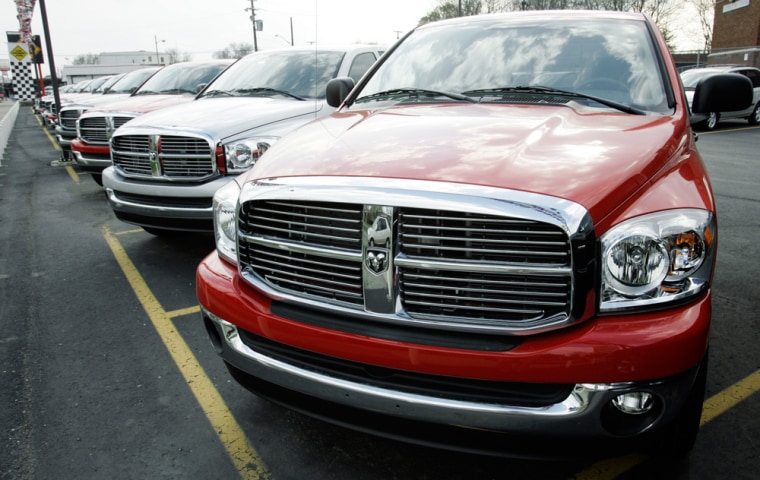Go shopping for a Dodge Ram, and you may find a $4,500 factory incentive awaits. On top of that, it's likely a dealer will give you an all-smiles, deep-discount price that's lower by thousands more.
Despite these inducements, Rams are languishing on lots. Nationwide dealers reported a 117-day inventory as of Nov. 1, according to Automotive News. Jonathan Banks, senior director of the Automotive Leasing Guide-affiliated ALG Consulting Group, says that excess dealer inventory is a leading indicator that it's time not just for more incentives but possibly a price cut.
Good thing, because the Dodge Ram is among the most egregiously overpriced cars in the U.S. Rounding out the top five: the Mercury Grand Marquis, Ford's F-150, the Dodge Durango and the GMC Envoy.
In order to find the market's currently most overpriced vehicles, we first looked at market price figures supplied by Vincentric, a firm that tracks vehicle ownership costs for the auto industry. These are updated monthly to reflect marketplace inventory, demand, rebates and incentives, and represent the price that a buyer typically pays. We ruled out any vehicles where the market price was discounted less than 5 percent from the MSRP.
Next, we looked at J.D. Power's 2007 Automotive Performance, Execution and Layout (APEAL) survey results and ruled out vehicles with average or better satisfaction or better than two and a half stars. We consulted Consumer Reports' Owner Satisfaction results, data from a survey that asks owners, considering a wide range of factors including price, "Would you get this car again?" Cars with better than average scores were dropped. Then we looked at one-year residual value data from ALG, which help quantify the rapid depreciation of an overpriced vehicle directly after the sale. Finally, we reordered the remaining vehicles by the amount overpriced (difference between market price and MSRP) and ranked the top 15.
We looked at price cuts because, while alluring, they may indicate a carmaker's desire to jump-start sluggish sales, which may in turn indicate a less than accurate initial sticker price. Though a number of external forces — such as those related to the economy — can suddenly precipitate a short-term price cut, typically automakers eager to unload their vehicles will keep adjusting the transaction price through incentives in an attempt to make the vehicle more appealing.
"Short-term incentives won't have much of an effect on residuals," says David Wurster, president of Vincentric, "but a continuous pattern of using them begins to reflect a longer-term lack of appeal for a vehicle."
Some might argue this is true of the Ram 1500 pickup. The market is in the midst of a long-term change in product preference, says Wurster, toward so-called crossover SUVs that are less trucklike. The demand for pickups is currently down, so there needs to be a serious adjustment in production and pricing. There have already been some lowered MSRPs on trucks, and Toyota has brought out a lower-priced "EGrade" work-truck model of its Tundra full-size pickup.
The price adjustments are painful to corporate egos and bean counters, but ultimately better for the industry and for buyers. Banks says that between two vehicles, one priced at $25,000 and the other priced at $28,000 with a $3,000 incentive, the $25,000 vehicle is going to have a better residual value and be worth more three or five years down the line.
Some of our overpriced vehicles — including the Chevrolet Trailblazer and Envoy--are simply suffering from a lack of demand and sales that are losing steam.
"You also have a lot of products that are old, like the Ford Ranger," says Christopher Li, a research specialist at J.D. Power and Associates, who added that the Chevrolet Colorado — another pickup with lagging appeal — hasn't been competing well either in a segment that's become dominated by the Toyota Tacoma. Fuel prices, meanwhile, are putting the squeeze on mid-size sport-utility vehicles. The result? Price cuts.
Vehicles may also be overpriced because the automaker didn't follow the right pricing strategy in the first place. For instance, some domestic brands have been pricing not to the market but where they aspire to be, which results in deep incentives and poor residuals, says Banks, who cites the $36,195 Chrysler Pacifica, which was originally priced as competitive with the Lexus RX, as a prime example.
Automakers run into further trouble when they bring out a model that strays too far from the image of the brand.
"Companies should produce products that enhance their brands but still are true to the heritage," says Wurster, who points out that Volkswagen's Phaeton, and its high price (one model had an MSRP exceeding $100,000 in 2006), was a blunder while the $104,000 Lexus LS600h hybrid flagship is a natural extension.
Price dissatisfaction is also represented in other metrics, namely satisfaction. No one wants to pay for a product he or she isn't happy with. J.D. Power, which measures how gratifying a vehicle is to own and drive in the first 90 days of ownership with its annual APEAL survey, says that a higher score corresponds to lower model incentives.
Consumer Reports also has an Annual Car Owners Satisfaction Survey in which it asks, considering a wide range of factors including price, whether respondents would buy their vehicle again.
One final metric that warrants mention: length of ownership. Robert Smith, manager of car information products at Consumer Reports, says that even if the automaker's piling on the incentives and the residuals are embarrassingly low, it's actually not overpriced if you plan to keep the vehicle for a long time.
"Are you planning to keep the vehicle for six, seven, eight years?" he asks. "Then you aren¹t so concerned with resale."
